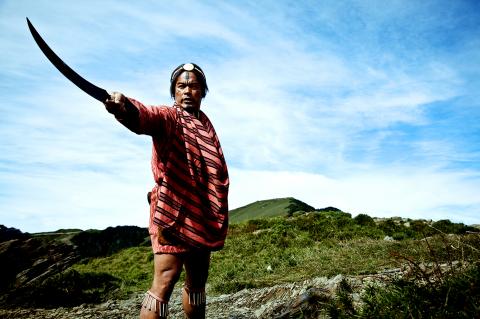It wasn’t actors and actresses grabbing headlines on this week’s entertainment pages, but rather Taiwanese films, which filled the nomination list for the 48th Golden Horse Awards.
Wei Te-sheng’s (魏德聖) Seediq Bale (賽德克‧巴萊) was at the top of the list with 11 nominations, including best picture and best director. The two-part Taiwanese epic has already raked in NT$470 million in ticket sales at the box office, according to the Apple Daily.
Two other homegrown hits, Jump Ashin! (翻滾吧!阿信) and You Are the Apple of My Eye (那些年,我們一起追的女孩) are also potential Golden Horse winners. Jump, whose lead actor Eddie Peng (彭于晏) is the only Taiwanese in the running for the best actor gong, picked up five nominations, while You Are the Apple bagged four.

Photo: Taipei Times
For the China Times, the nominations are heralding the “revival of the nation’s film industry” (國片復興). The paper noted that this year the Golden Horse axed its Most Outstanding Taiwanese Film Award because there is no longer any need. Locally produced movies these days are on a par with big-budget Hong Kong and Chinese movies, one Golden Horse judge was cited as saying.
And Taiwanese filmmakers are sticking to their guns when it comes to dealing with investors from China. According to the China Times, the producers of Seediq Bale decided to turn down funding from a Chinese investor who requested that Wei add the role of a journalist to the movie.
“I preferred to risk the NT$700 million, and besides, you can’t change history,” coproducer Huang Chih-ming (黃志明) told the China Times. “No compromises, that’s the Taiwanese spirit.”

Photo: Taipei Times
Jump Ashin! director Lin Yu-hsien (林育賢) encountered a similar request from Chinese investors. Lin, whose movie is based on the life of his gymnast brother, was asked to change the story, in which Lin’s brother Ashin (林育信) flees his home in Yilan to hide in Taipei. The Chinese investor asked Lin to have his brother escape by boat to Xiamen instead.
Lin declined to make the change. “My brother would have killed me!” he said.
Another potential homegrown Golden Horse winner is actress Shu Qi (舒淇), who picked up a Best Actress Award nomination for her role in A Beautiful Life (不再讓你孤單).
According to the Apple Daily, she received the news on the phone from a gossip reporter, who greeted her by saying “Congratulations.” “What for?” she asked tartly. “I haven’t gotten married and I’m not pregnant.”
When the reporter broke the news of her nomination, she broke down in tears, and thanked director Andrew Lau (劉偉強). “I’m weeping bitter tears right now,” she said.

In the March 9 edition of the Taipei Times a piece by Ninon Godefroy ran with the headine “The quiet, gentle rhythm of Taiwan.” It started with the line “Taiwan is a small, humble place. There is no Eiffel Tower, no pyramids — no singular attraction that draws the world’s attention.” I laughed out loud at that. This was out of no disrespect for the author or the piece, which made some interesting analogies and good points about how both Din Tai Fung’s and Taiwan Semiconductor Manufacturing Co’s (TSMC, 台積電) meticulous attention to detail and quality are not quite up to

April 21 to April 27 Hsieh Er’s (謝娥) political fortunes were rising fast after she got out of jail and joined the Chinese Nationalist Party (KMT) in December 1945. Not only did she hold key positions in various committees, she was elected the only woman on the Taipei City Council and headed to Nanjing in 1946 as the sole Taiwanese female representative to the National Constituent Assembly. With the support of first lady Soong May-ling (宋美齡), she started the Taipei Women’s Association and Taiwan Provincial Women’s Association, where she

Chinese Nationalist Party (KMT) Chairman Eric Chu (朱立倫) hatched a bold plan to charge forward and seize the initiative when he held a protest in front of the Taipei City Prosecutors’ Office. Though risky, because illegal, its success would help tackle at least six problems facing both himself and the KMT. What he did not see coming was Taipei Mayor Chiang Wan-an (將萬安) tripping him up out of the gate. In spite of Chu being the most consequential and successful KMT chairman since the early 2010s — arguably saving the party from financial ruin and restoring its electoral viability —

It is one of the more remarkable facts of Taiwan history that it was never occupied or claimed by any of the numerous kingdoms of southern China — Han or otherwise — that lay just across the water from it. None of their brilliant ministers ever discovered that Taiwan was a “core interest” of the state whose annexation was “inevitable.” As Paul Kua notes in an excellent monograph laying out how the Portuguese gave Taiwan the name “Formosa,” the first Europeans to express an interest in occupying Taiwan were the Spanish. Tonio Andrade in his seminal work, How Taiwan Became Chinese,